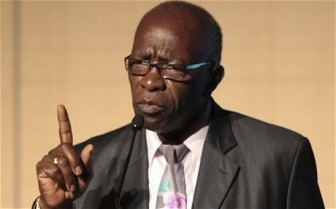BERNE, (Reuters) – FIFA has refuted allegations by former vice-president Jack Warner that implied a decision to sell him World Cup television rights was a reward for supporting Sepp Blatter’s presidential campaigns.
FIFA said that Warner’s statement last week included “several inaccuracies and falsehoods” and that the television rights issue “had nothing to do with the 1998 or 2002 election campaigns, or with any other election campaign.

“To imply the contrary is completely false,” it added in a statement.
Blatter, first elected in 1998 when he succeeded Joao Havelange as FIFA president, was re-elected for a fourth term on June 1 and vowed to introduce reforms in the wake of bribery and corruption allegations.
Warner, who was CONCACAF president for 21 years and was seen as a major powerbroker, resigned from all his soccer positions in June after he was suspended by FIFA following allegations in a cash-for-votes scandal in the run-up to the presidential election.
The Trinidadian, who had promised to unleash a “tsunami” against FIFA following his suspension, said on Dec 28 that he was awarded the rights for seven World Cups at a minimal fee.
For the 1998 tournament, Warner said FIFA sold them to him, through a Mexican company, for just $1.
Warner said the money he made from selling the rights “was used primarily to assist in the development of football in Trinidad and Tobago”.
“This was just after Blatter had won the FIFA presidency following a most brutal campaign against Lennart Johansson, a campaign in which (Mohamed) bin Hammam and I played critical roles in support of Mr.Blatter,” Warner said in his statement.
FIFA replied that Warner had been awarded television rights for Trinidad since 1986 and that it was normal practice at the time for them to be provided for only a symbolic fee.
“Until 1998, TV rights were provided by the rights-holders for symbolic sums in many territories (for example in Africa), in order to maximise the worldwide television coverage and also to support national associations and confederations with a source of revenue for football development,” it said.
It added: “Jack Warner obtained the TV rights for the FIFA World Cup in the Caribbean, for the purpose of supporting football development in the Caribbean Football Union, already in 1986, and not 1998.
“Such rights were ceded in order to provide an additional source of revenue for football development in the CFU.”
It added: “TV rights for the 2002 FIFA World Cup in the Caribbean were approved by the FIFA executive committee at their November and December 2001 meetings, not after the 2002 elections.”
Warner has been heavily critical of the FIFA boss ever since he resigned midway through this year as president of CONCACAF.
Warner was accused of having organised a meeting where Bin Hammam, the former Asian Football Confederation president from Qatar who was running against Blatter for the presidency, was alleged to have distributed $40,000 in brown envelopes to Caribbean soccer officials.
Bin Hammam, who like Warner has denied the allegations against him, was banned for life from all football-related activity.




